
World Water Day 22nd March, is about focusing attention on the importance of water. This year's global theme Groundwater, draws attention to the hidden water resource. A look here in the UK
March 22nd, 2022 is World Water Day. A United Nations observance day to focus attention on the global water crisis. Water scarcity can affect us all and in a time of food, and energy, supply and cost concerns we should consider our precious water supplies too. It is a valuable resource, a lifeline and as our climate changes, so must the way we manage it.
Here in the UK, over the past year, we have seen Scotland with water scarcity notices and supply concerns in Autumn 2021. Southern England had a very wet summer but then a very dry January. The West Country and Northern England saw heavy rainfall after 3 storms in February and serious river flooding again threatening towns. At times it seems like feast or famine which is why this year’s focus is on Groundwater rather than surface supplies.
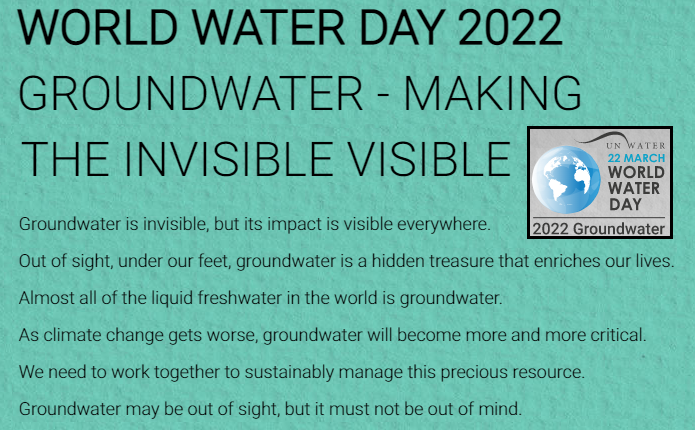
Two billion people worldwide are currently living without access to safe water. A core focus of World Water Day (WWD) is to inspire action towards the (global) Sustainable Development Goal (SDG) 6: Water and sanitation for all by 2030.
Groundwater accounts for 99% of all liquid freshwater on Earth. A lot of our water is salt water, some present as gas or ice and some freshwater is at the surface- lakes, rivers etc. Most is under the surface and the principal source of our water supply. This is the case in southern England, more so than from reservoirs. The aquifers beneath our feet are there to store and move water. They are formations of rocks, sands and gravels that have been shaped to hold water. The level of the water changes with the seasons, with longer term rainfall and also with water abstraction (removal) The useful depths vary, and the aquifers need protecting. They can act as a buffer, and this is the important bit when you add in climate change. As rains become less frequent but heavier in summer, or winter rains become heavier and flooding more likely, storage is important
Ground water has a vast potential, already tapped into in hotter climate countries and rural dwellings here in the UK from boreholes. It provides half of the volume of water abstracted for domestic use around the world and about a quarter of all water used for irrigation. Our population is increasing and so water use is projected to increase by roughly 1% per year over the next 30 years. (UN). Surface water supplies will struggle.
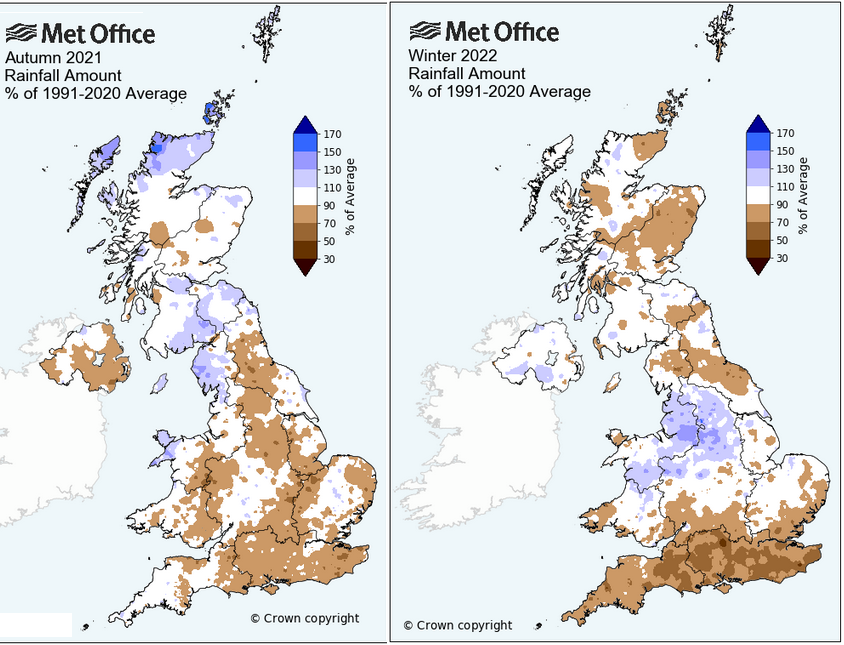
Here in the UK, we have coastal flooding, river flooding, surface water flooding when the rains are torrential and struggle to drain off roads and also groundwater flooding. This is when the water table rises and reaches ground level, and we see water on the surface. The Environment agencies record data and issue summaries on monthly situations.
16th March Kent-“ Groundwater recharge in Kent has been slowing down over the last 2 months, caused by the winter period seeing below normal rainfall overall. Groundwater levels remain normal for this time of year. The forecast for the remainder of March shows largely dry weather is expected, such that the month is likely to see below average rainfall overall, which would limit further recharge. “ EA
The contrast from January 2022 to February made a big difference to reservoirs in England. Dry January impacted on the expected seasonal recharge for groundwater resources. The wet February replenished the reservoirs.
“Groundwater levels normally rise and fall with the seasons, reaching a peak in the spring following replenishment through the winter (when evaporation losses are low and soil moist). They decline through the summer and early autumn.” Hydrological Summary for the UK
Low rainfall can lead to drought. This varies by area, how long it lasts and how intense the effects are. If a dry spell flows a dry winter, the aquifers won’t have recharged. Then what is showing at the surface (low river rates, low reservoirs and dry ground) is magnified. For spring, agriculture needs soil water in the growing season. A dry spell then can have worse effects. In summer or other hot spells, the same crops will need irrigation but there will be extra demands from people and homes. Not just the threat of a hose-pipe ban. Looking towards Groundwater avoids some of the weather impact fluctuations. The groundwater levels obviously vary but less rapidly and have the longer term storage.
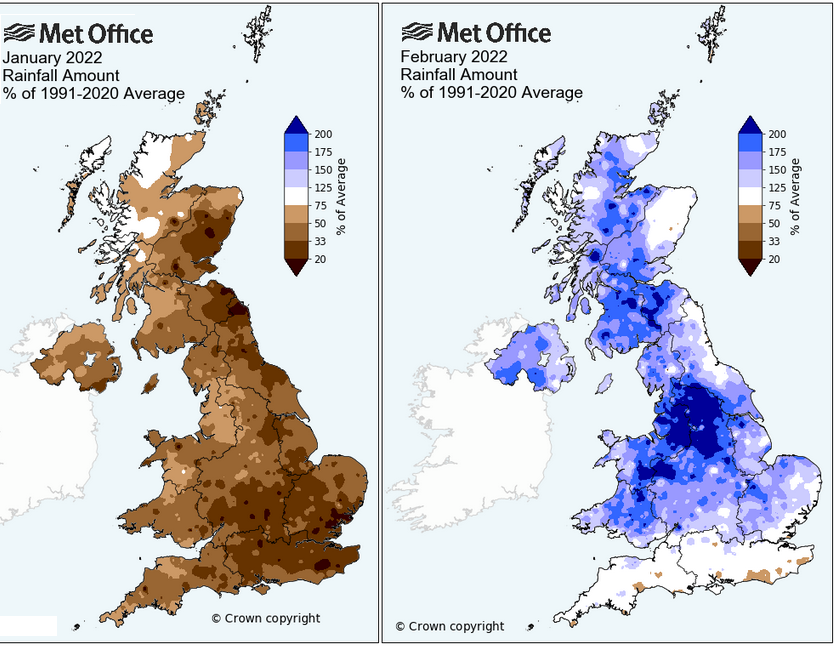
Sir James Bevan (CE Env. Agency, England) gave a speech in February 2022 at an international Water-tech summit that discussed many things including flood and drought resilience, drinking water quality and resource recovery. He highlighted how important water was, that it is a precious commodity but also fragile. With climate change, a water crisis is already happening and this relatively scarce resource is easily damaged, and that damage can last a long time. Old coal mines cause pollution as do new forever chemicals (PFAs). These are carried into rivers and can reach the aquifers. Solutions are needed to a global problem.
James Bevan and the UN talk about raising the profile of water, its value. Management needs to improve as the population grows and demand increases. Quality groundwater needs protecting from pollution which now comes mostly from agriculture but also industry and towns. Crops deplete the water levels with abstraction then rainfall when it comes, recharges. The growing population brings larger demands for food and so irrigation. Political disputes and war add to water supply issues as the water table will extend across states as rivers at the surface flow between countries. Water security is not just the fiction of a James Bond film. There is also the issue of water-borne diseases, a huge proportion of all illnesses. These particularly affect women and girls whose whole lives are ruled by whether there is clean water available or will they have to walk miles to collect it and not go to school. It’s a political hot potato, ensuring "availability and sustainable management of water and sanitation for all." (SDG6)
“Climate change expresses itself through water 9 out of 10 natural disasters are water-related. Water-related climate risks cascade through food, energy, urban and environmental systems “World Bank
Groundwater will help communities cope with climate change. UN “it will play a critical role in adapting to climate change”. Smart water management policies are needed to improve access and allow sustainability. And each person has a part. Water conservation is important here in the UK and around the world. It relates to people’s health in terms of clean drinking water but also as we have seen with the hand washing need throughout the COVID pandemic. Water is important for industry, but more energy is needed to pump groundwater than for water at the surface. Saving water, saves energy.
Around the UK, NI Water said this week “currently our reservoirs are at 96% capacity leaving us in a healthy state for this time of year following the winter replenishment.” Scottish Water “Reservoir levels are at 99% but this can quickly change if we experience an extended dry spell, and the situation varies greatly across Scotland.” Total reservoir stocks for England were at 95% of total capacity at the end of February.
This week we are in a steady dry spell and these swings from dry to very wet seem to be happening more often. A theme of stagnating weather situations. High pressure giving lengthy dry spells then a shift to endless windy weather for northern Britain. Then it starts to rain, and the flooding takes hold.
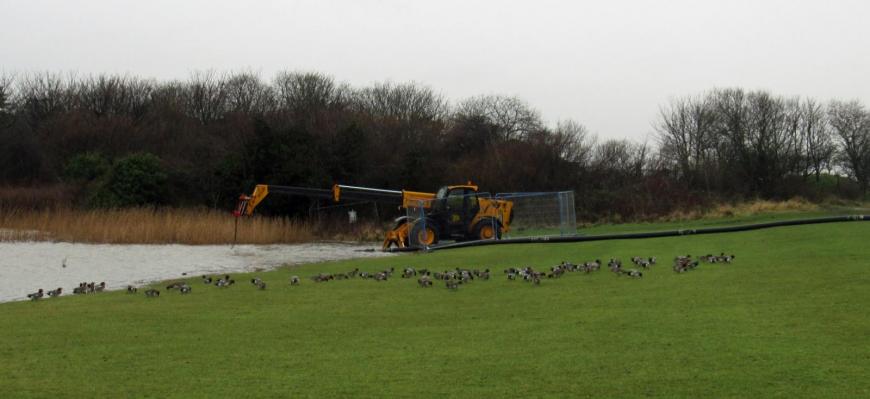
I asked Netweather community member NorhternLights about the situation in Grampian
“No real concerns here after a very dry January but a very wet February. It could be into summer before we have concerns. Eastwards from Elgin, they were drier in February and the sandy soils near the coast were blowing at the beginning of March so any more dry weather will be serious for them. The soil (sandy clay loam here but very stony) is just drying out nicely for sowing spring barley in the next week but quite a number of autumn-sown cereals are looking a bit washed out but should improve as the first dressings of fertiliser get to the roots. The only noticeable thing is the extremes we get for a period of time either very dry or very wet spread out through the whole year now.”
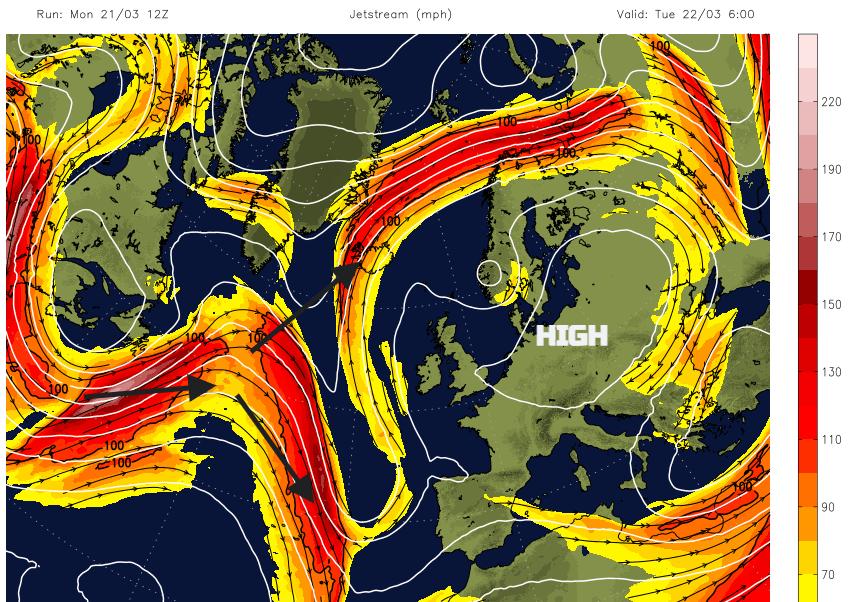
The steady settled weather of the past weekend looks set to last this week. A blocking high pressure drifts our way from Denmark and stops any Atlantic fronts and their rain from reaching the UK. The jetstream has split, one portion reaching well north into northern Scandinavia and another portion diving down past Portugal with Spain having very unsettled weather. The high pressure and overall dry theme continues through the coming weekend into next week. Frontal rain may brush the far north of Scotland before that and there will be just a few well-scattered showers but overall it looks like the rest of March will on the drier side.
So, expect to hear more about Groundwater today and in the coming years with new ideas and processes closely linked to energy saving.
“We still encourage customers to save water all year round as this not only helps protect water resources, especially in the face of changing and less predictable weather patterns, but also reduces the amount of water which requires energy to be treated and pumped. “ Scottish Water
This summer, holidaymakers (whether here in the UK or abroad) should be mindful of their water use, as tourism combined with warmer weather can put pressure on supplies, particularly in rural areas or warmer climes.
"Water conservation is essential all year around. There is a massive willingness among the public to conserve water; it can often be the case people simply don’t realise that little changes can make a big difference. We need to act together, and we need to act now to address the greatest global challenge of our generation. Improving water security will remain challenging for all water companies across the UK.” NI Water
Loading recent activity...